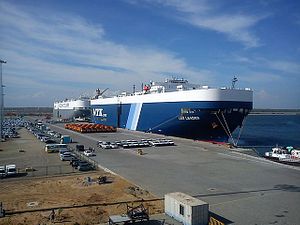On Saturday, the government of Sri Lanka completed the formal handover of the strategic port of Hambantota to China, which will take control of the facility on a 99-year lease.
Sri Lankan Prime Minister Ranil Wickremsinghe attended a special event to mark the handover, formally described as a Concession Agreement, on Saturday in the port city.
Hambantota International Port Group (HIPG) and Hambantota International Port Services (HIPS), two new companies set up by the China Merchants Port Holdings Company and the Sri Lanka Ports Authority, will own the port. Saturday’s ceremony marked the start of HIPG and HIPS-managed operations in Hambantota Port.
Earlier this year, in July, China Merchants Port Holdings Company agreed to pay $1.12 billion for an 85 percent share in Hambantota port on a 99-year lease.
On Saturday, China Merchants Port Holdings Company made a first installment payment to the Sri Lankan government for control of the port.
According to Sri Lanka’s News1st, the Sri Lanka Ministry of Ports and Shipping noted that the first payment represents 30 percent of $974 million, with the Chinese side investing an additional $146 million directly in Sri Lanka.
Hambantota, which sits on Sri Lanka’s southern coast, provides access to critical Indian Ocean sea lanes.
The acquisition of the port by China has spurred particular alarm in India, which is concerned about Beijing’s growing strategic and economic footprint in the Indian Ocean region.
China, as part of its Belt and Road Initiative, is interested in expanding its footprint in the Indian Ocean.
In addition to Sri Lanka, Beijing has made important inroads in the Maldives, which concluded a free trade agreement with Beijing at the end of November.
China’s acquisition of Hambantota port, according to assurances given by the Sri Lankan government, is purely intended for civilian purposes.
Beijing has just one overseas military base for the People’s Liberation Army-Navy, in Djibouti near the port of Doraleh. The base opened formally in August 2017.
Despite Sri Lankan assurances, Indian observers express concerns that Beijing could operationalize Hambantota as a resupply node for the People’s Liberation Army-Navy in the future.
Accordingly, to make this more difficult for China, New Delhi is mulling an investment in Hambantota’s airport.
Moreover, changes in Sri Lankan politics could permit even closer ties between Beijing and Colombo. Under the previous government led by President Mahinda Rajapaksa, a PLAN Song-class submarine was allowed to visit the Colombo International Container Terminal.
The current Sri Lankan government, led by President Maithripala Sirisena, has exercised more caution, rejecting a Chinese request for a submarine visit earlier this year.

































